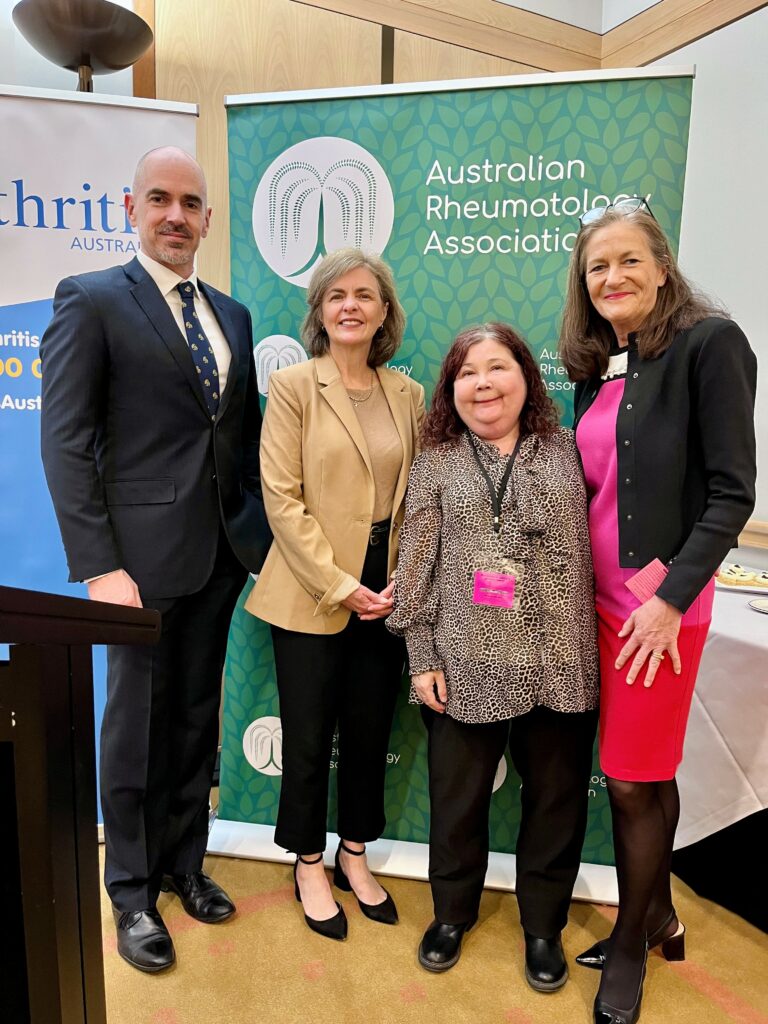If you live with rheumatoid arthritis (RA), you may have also noticed variations in the range and quality of care you’ve received across the Australian healthcare system. If you could design a set of quality standards for every health professional involved in your care to follow, what would you include?
- Shorter waiting lists?
- More attention to pain management?
- Better communication skills?
- Consideration of your cultural background?
Great news! A group of Australians with rheumatoid arthritis, rheumatology health professionals and others connected to this area of health have found a way to standardise and improve the quality of care for people with RA throughout Australia.


About the RA Clinical Care Standard
The inaugural Rheumatoid Arthritis Clinical Care Standard, recently published by the Australian Rheumatology Association (ARA), outlines the main standards people across the country with rheumatoid arthritis should expect when accessing care for their condition.
Clinical care standards (or quality standards) include a short list of statements about specific aspects of patient-centred care where a focus on better quality of evidence-based care can lead to measurable improvement in outcomes. While the quality of care for rheumatoid arthritis in Australia is high, especially when compared to other countries, our delivery of such care is not consistent and there are many areas where we can do much better.
The Australian Commission on Safety and Quality in Health Care already has many clinical care standards for other health issues but none for autoimmune conditions. Recognising this gap, the ARA set about developing a set of national clinical care standards, beginning with standards for rheumatoid arthritis.
Australia’s first RA Clinical Care Standard aims to improve the diagnosis and management of RA in adults. It consists of a list of seven guiding principles and 12 standards of care where improvements should lead to better health outcomes and improved quality of life for people who live with this chronic condition.
The 12 areas of care targeted for improvement are:
- Time to first rheumatology appointment
- Time to treatment with disease-modifying antirheumatic drugs (DMARDs)
- Safe use of DMARDs
- Access to supportive resources
- Disease activity monitoring
- Access to advice between rheumatology appointments
- Support to engage in physical activity
- Pain management
- Emotional and psychological well-being
- Vaccination status
- Heart disease risk assessment
- Fracture risk assessment
How the RA Clinical Care Standard Was Developed
The Rheumatoid Arthritis Clinical Care Standard was developed by the ARA in collaboration with Arthritis Australia and a working group made up of rheumatologists, other health professionals with an interest in rheumatology and people with lived experience of RA.
The standard was informed directly by preliminary work by Arthritis Australia and the ARA in gathering feedback from a broad range of Australian RA consumers and clinicians. As part of that process, participants reviewed existing standards from Europe and the UK. They were asked to recommend aspects of those standards that could work here and to add suggestions based on their lived experience.
The Rheumatoid Arthritis Clinical Care Standard working group looked at these recommendations, the existing standards from other countries and the relevant Australian clinical guidelines for RA. Through a series of workshops, the working group created a short list of quality standards (accompanied by evidence-based rationales for the statements) and related guiding principles. These were presented to Australian rheumatology consumers and health professionals via a national survey.
The working group then picked the top 12 statements based on the survey results and fine-tuned them. Finally, a draft of the RA standard was sent to ARA members and other stakeholders before the launch of the standard on 4 December 2023.
“Two summary versions of the standard are available to download from the ARA website. One version is for healthcare professionals and the other is for consumers. A full version of the standard will be submitted for publication in 2024.”
How Health Professionals Can Use the RA Clinical Care Standard
Australian rheumatologists and other health professionals who care for people with RA now have clear guidelines to help them consistently deliver quality care no matter where they or their patients live in Australia. The standards can also spark a range of ideas for tangible ways health professionals can improve their level and quality of patient-centred care.
The standards are not strict rules as the authors understand some factors are beyond the control of clinicians or consumers. For example, the first standard states, “People for whom there is a high clinical suspicion of rheumatoid arthritis are seen by a rheumatologist within 4 weeks of referral.” While this is ideal, wait times for an initial appointment with a rheumatologist can currently stretch for months, partly due to the shortage of rheumatologists in Australia. However, the standards still provide worthy goals to aspire to.
How People with Rheumatoid Arthritis Can Use the RA Clinical Care Standard
Knowing that your healthcare providers now have guidelines to help them standardise and improve their quality of care can be very reassuring for people with RA.
You can give members of your healthcare team a copy of the health professional version of the document as they may not be aware of it yet. You could also ask them to help spread the word and share it with their colleagues.
Finally, if you have RA, you now have a concrete resource you can use as a reference to check you are receiving the best possible care for your needs and circumstances. It can also empower you with the information to advocate for better quality care if you feel you need it.
Disclosure. The author of this article, Rosemary Ainley, was a consumer representative in the Rheumatoid Arthritis Clinical Care Standard working group. The information she has shared here is all public knowledge.
Join the CreakyJoints Australia Community
Becoming a CreakyJoints Australia member takes just a few minutes. You’ll receive our members’ e-newsletter featuring:
- Reliable information about arthritis types and treatments.
- Tips for managing daily life with arthritis and related conditions.
- Personal stories from people living with similar conditions to you.
- Links to our podcasts featuring interviews with health clinicians and patients.
- Surveys to help us discover what’s important to you.
Follow Us on Social Media
We set up our CreakyJoints Australia Community group on Facebook to share our latest news, feature articles, arthritis resources and other content with you. We invite you to provide feedback on any of our posts and chat with each other in the comments. You are also welcome to share ideas about content you would like us to create or share practical tips for living with arthritis and related conditions.
You can also follow CreakyJoints Australia on Twitter/X and Instagram.
Keep Reading
- A Patient’s Guide to Living with Rheumatoid Arthritis in Australia
- Rheumatoid Arthritis Versus Osteoarthritis: What’s the Difference?
- Patient PrepRheum podcast
- Why I Speak Up as a Healthcare Consumer (and How You Can, Too)
- 10 Things to do After an Arthritis Diagnosis: Top Tips From Patients
Photo at top of page has been used with the permission of the Australian Rheumatology Association.




